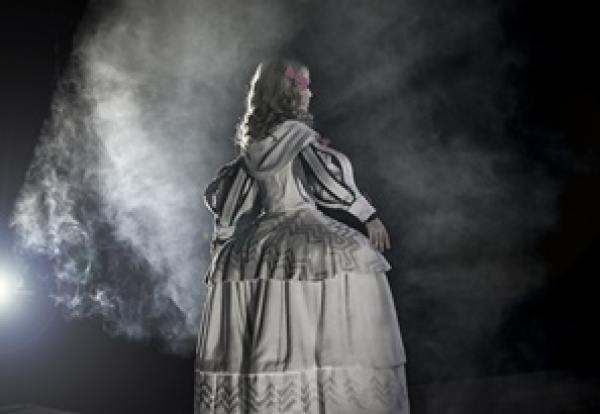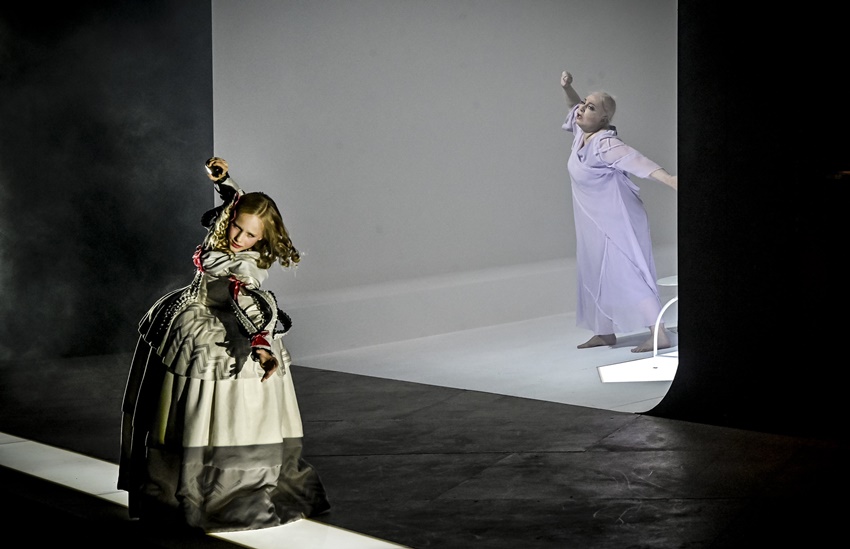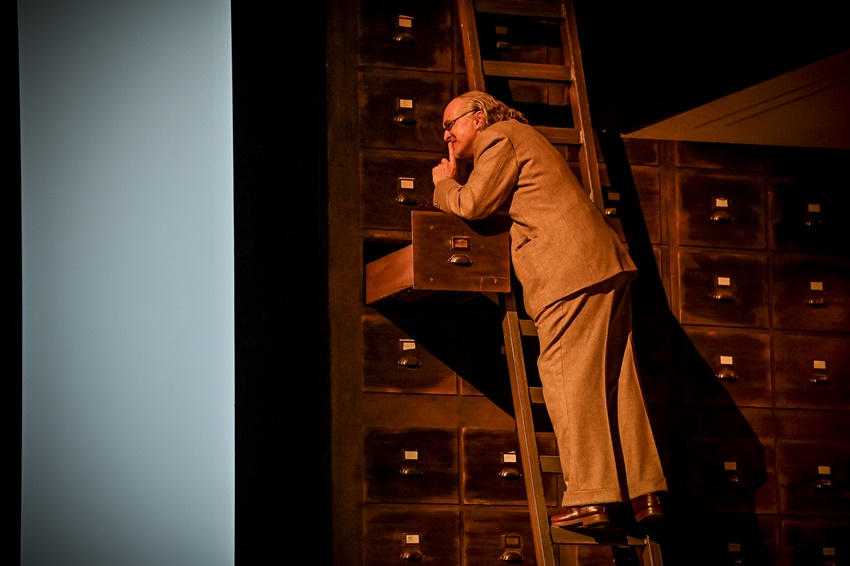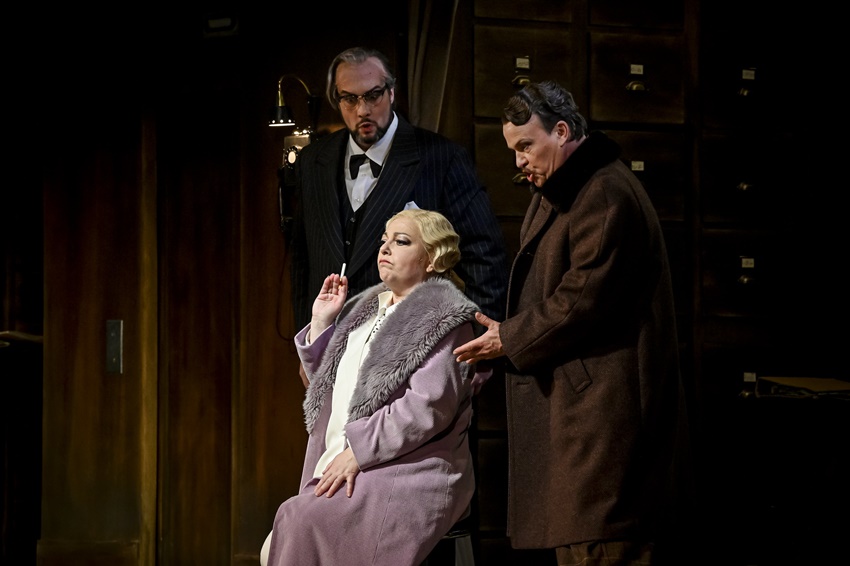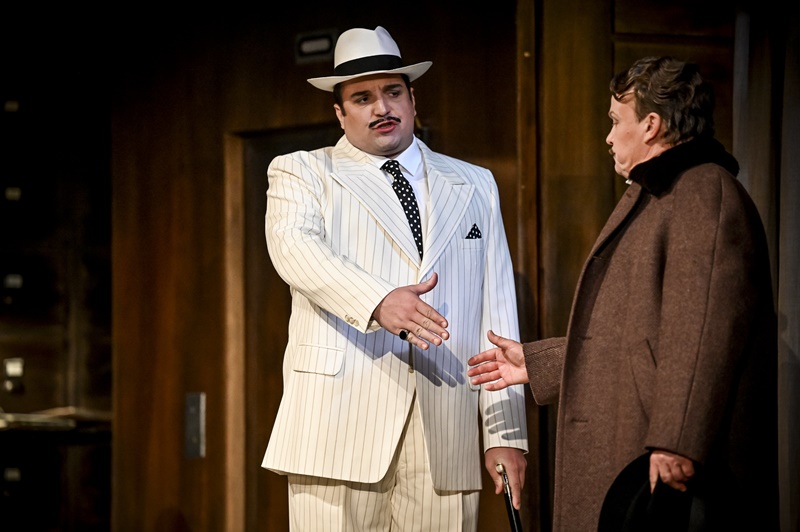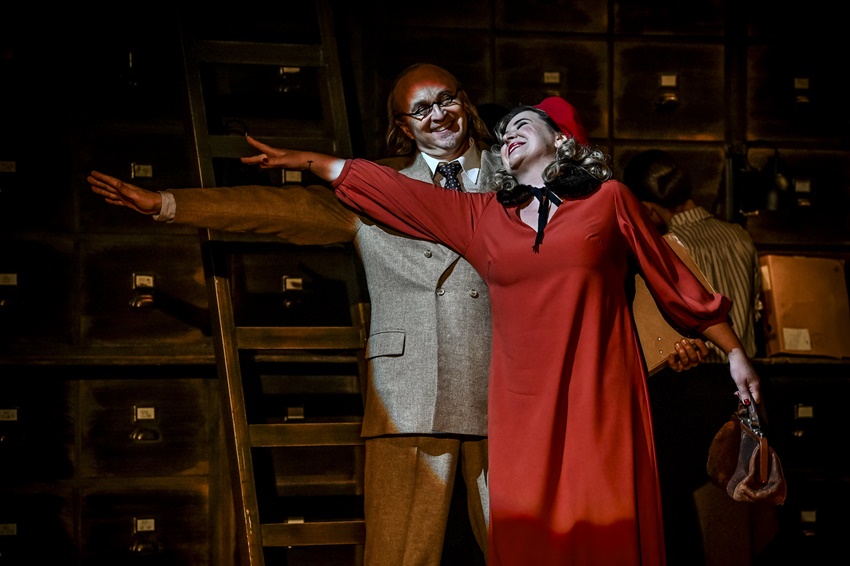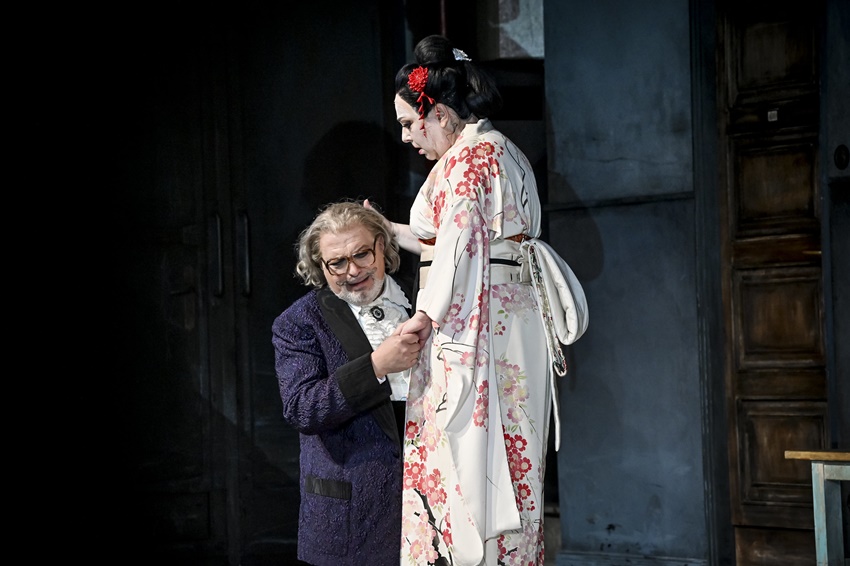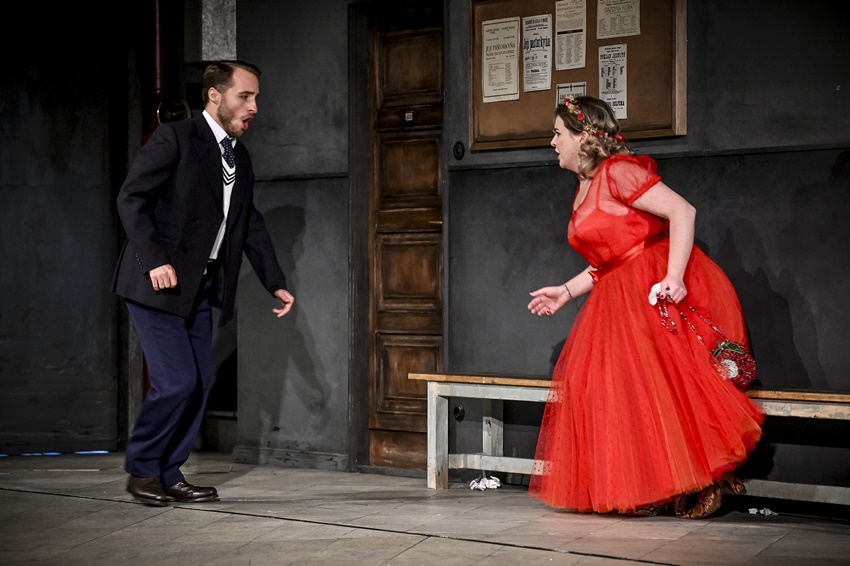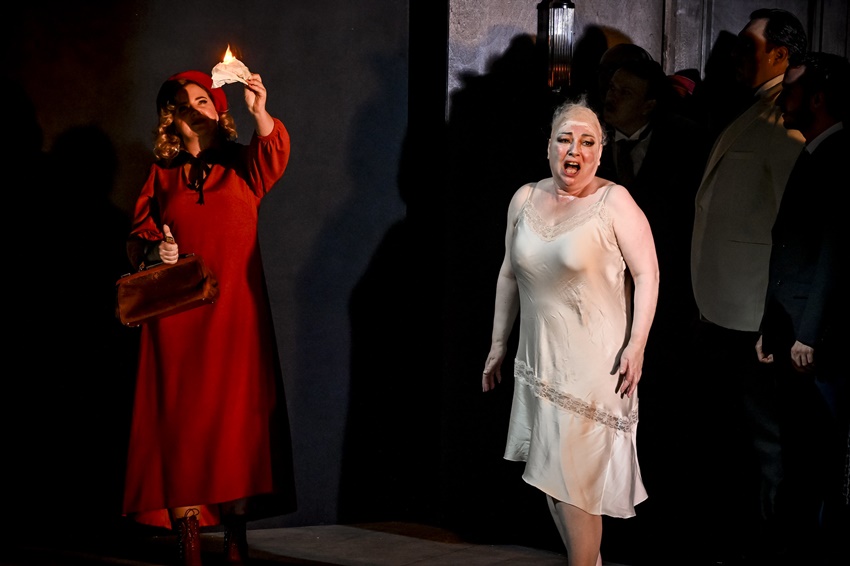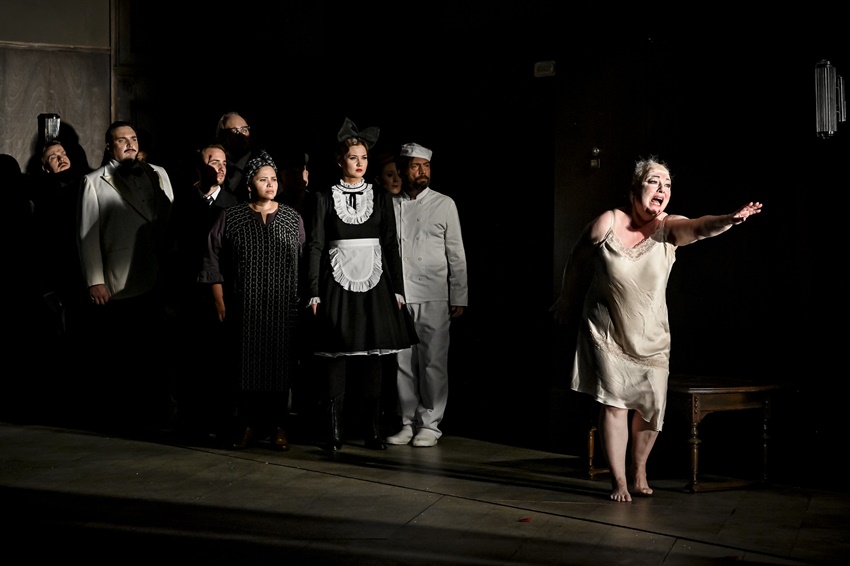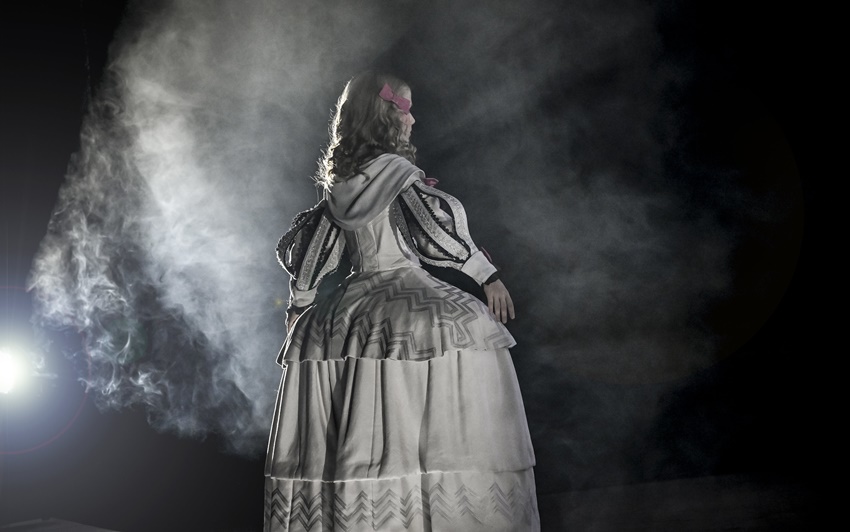To define its genre, it has been called ’detective opera’, ’thriller’ and ’science fiction opera’. Indeed, Elina, the protagonist of Leoš Janáček's The Makropulos affair (Věc Makropulos), which premiered in Brno in 1926, is over 300 years old. But the message of this undoubtedly bizarre and fantastic story is very real, raising profoundly philosophical questions about the meaning of our lives and our mortality.
Elina Makropulos (now Emilia Marty), a celebrated opera diva caught up in a complicated inheritance affair, has remained young for centuries thanks to an invention by her scientist father. The potion is wearing off, and Elina can only continue her earthly existence with the help of a secret formula from the estate of her long-dead former lover. But she is at a crossroads. Her increasingly lonely life has left her bitter and desperate. She has become alienated from the world, from the people, indifferent to others and their deaths, and her life is empty. She realises she no longer desires life, but death. 'If you only realised how easy life is for you!', she shouts to those around her at the end of the work. 'You are so close to everything! For you, everything makes sense! For you, everything has its value! Fools, you are so blissful (…) for the trivial chance reason that you are going to die so soon.' [Source of the English translation: Opera guide]
Elina then and now
Stephan Rügamer (Vítek)
This time, the production was presented to the audience of the Janáček Brno Festival in a guest performance of the Staatsoper Unter den Linden in Berlin. The director of the production, the world-famous Claus Guth, is no stranger to Czech opera, having directed the highly successful production of Jenůfa at Covent Garden in 2021, among others. His current production of The Makropoulos affair premiered in Berlin in 2022.
Claus Guth's staging is colourful, spectacular and effective, but his concept of the piece as a tragicomedy is debatable.
In the opening scene, we see a split stage on one side with clerks working mechanically in a pile of filing cabinets in the law office on the other side of the stage, Elina stands in a room-sized empty box, bathed in a blinding light and in billowing smoke. The surreal, phalanstery-like atmosphere of the science fictional space is a chilling reminder of Elina's isolation and loneliness, and that despite her being flesh and blood, she is in fact an unearthly figure living her daily life among mortals. Retreating into her solitude, she tries day by day to 'recreate' her young self with increasing effort.
The appearance of the young girl, wearing an elegant Baroque dress, walking silently across the stage from time to time, is one of the most impressive moments of the direction. The girl, of course, (also) appears in Elina's imagination. Her flashback to the past is particularly shocking because of the distance in time: she remembers her 16th century self, 300 years earlier. In parallel with the little girl, an elderly woman occasionally crosses the stage, projecting the image of the old Elina and reminding the audience – spoon-feeding the spectators a bit – that Elina's youth will not last forever.
Dorothea Röschmann (Elina Makropulos), Aleš Briscein (Albert Gregor),
and Jan Martinik (Dr. Kolenatý)
Adam Plachetka (Jaroslav Prus) and Aleš Briscein (Albert Gregor)
It is a clever directorial solution how in Act 1 the staff of the law office illustrate the repetitive, never-ending process of filing with pantomime-like 'dancing', often to the rhythm of the music, sometimes with jerky, at times with slowed-down movements. Similarly, in the scenes of the second act, taking place at the opera house, we see independent little shows by the staff that run parallel to the real action. We are also entertained by grotesque, acrobatic tableaux with sometimes difficult-to-decipher symbolism behind the unexpectedly opening lift doors. (Or it is only for Elina that the world becomes increasingly chaotic and absurd.)
The setting for the second act is less spectacular: we see an opera house corridor throughout. In this direction, Elina is preparing to perform Madama Butterfly. The figure of the Japanese girl appears several times in the background, in a bloody dress, with a dagger in her belly.
I find it problematic that the production has a predominance of comic elements. Claus Guth's interpretation of Janáček's opera is more of a tragicomedy than a tragedy. I am not saying the work cannot be interpreted in many ways, but the often farcical scenes in this production portray Elina's character in a way that is alien to the tone of the piece and the composer's original intention. In the first two acts, we see a neurotic, boisterous, often clumsy Elina on stage (in the opera scene, for example, her climbing on young Vítek is particularly ridiculous). And not the aristocratic, elegant diva, the cold, arrogant woman who now despises everything and everyone on earth, the cynical, mysterious woman with whom all men fall in love at once. ('I might even fall in love with her', Janáček himself wrote of his heroine. The composer, by the way, as with many of his later works, such as Kátya Kabanová, was inspired by his beloved lady Kamila Stösslová.)
Stephan Rügamer (Vítek) and Natalia Skrycka (Kristina)
Jan Ježek (Hauk-Šendorf) and Dorothea Röschmann (Elina Makropulos)
Elina is, of course, anxious, desperate, burnt out, tired, but it is only in the third act that she really opens up to the world, and her confession is soon followed by her final breakdown. Earlier, we should only see her softening, for example, in her eerie encounter with her now old lover Hauk-Šendorff. But the director also made a buffo character out of the tragic figure of the former suitor.
The staging, suggestive of a tragicomedy, probably also played a part in why the singers – with the possible exception of the singer portraying Jaroslav Prust – overacted their roles. Their gesticulations and facial expressions often seemed unnatural and artificial.
In Act 3, all this was only present in traces. The finale was fortunately taken seriously (although Elina could have behaved more elegantly and with more grace even in her 'drunk' scene). The last minutes were unforgettable. Even small moments remained memorable for me, such as the way the people surrounding Elina, finally realising they were looking at a centuries-old woman, were shivering as they tightened their coats. And the final scene is absolutely stunning as Elina, who is growing older by the minute, choosing death over eternal life, is slowly walking out into the blinding white light.
Linard Vrielink (Janek Prus) and Natalia Skrycka (Kristina)
Natalia Skrycka (Kristina) and Dorothea Röschmann (Elina Makropulos)
The Orchestra of the Staatsoper Unter den Linden conducted by Robert Jindra gave a first-class performance. The overture was characterised by a splendid harmony of brilliant timpani, richly resonant low strings. excited violins, and silvery brasses. The heartbreaking, flowing melodies perfectly described the painful loneliness of Elina, who was already on stage. Perhaps the only thing I missed was the even stronger contrasts between the extreme high and low notes that are so characteristic of Janáček. After the orchestral introduction, the first two acts are dominated by speech-like melodies by the singers, and the orchestral material by fragmented tunes and frequent dissonances, above all to portray Elina's restless soul. The sudden changes of rhythm and key, the numerous miniature instrumental solos (almost every instrument is 'introduced' separately), composed cleverly, require an incredible concentration on the part of the musicians. The orchestra's performance was characterized by accurate, vivid, tight, even virtuosic playing. And the musicians' expressive, high-quality interpretation of the sad, elevated lyricism of the grand melodies and warm harmonies that reappeared at the end of the piece was a worthy conclusion of the evening. Conductor Robert Jindra's 'weaving' of the musically very different first two acts into the third, giving the piece a single grand dramatic arc, was particularly commendable. (It is worth noting here that there was no intermission during the performance, and rightly so with this opera.)
Finale
The performance of Dorothea Röschmann as Elina deserves all the accolades. Her singing was clear, with powerful heights and solid notes in the middle register. I had serious reservations about her acting, but I attribute this to the director's concept. In the finale, however, everything was in the right place. Her voice was soaring, she was passionate, and while becoming older and older but increasingly ecstatic, she bid a last farewell to her centuries-old life. (I was surprised to learn from her biography that Dorothea Röschmann mainly sings Mozart, lyric soprano roles, and Lieder. Based on her current production, I assumed she was a dramatic soprano.)
Aleš Briscein, playing Albert Gregor, confidently took on the obstacles of his part, requiring a wide vocal range (even singing some powerful 'high C' notes) in his brassy tenor voice. He was convincing and spirited in his first act 'duet' with Elina (there are no closed numbers in the piece), as he was in the third act, which also required a heroic tone.
Natalia Skrycka was also a good choice for the role of Kristina, portraying credibly the naive girl's sincere, devoted enthusiasm for the diva. It is not her fault that in this production Kristina's character is more silly than usual.
Jan Martinik sang the less rewarding but no less demanding part of Dr Kolenatý, the lawyer, impeccably in his pleasant bass voice.
Adam Plachetka, a frequent guest in the world's leading opera houses, had no problem singing the role of Jaroslav Prus. He was elegant, cool and adequately obnoxious, with his bass-baritone cutting through even the denser orchestral passages clearly and with power.
There are no easy parts in the piece; neither are those of Vítek, Janek Prus, and Hauk-Šendorf. All these roles were interpreted by well-prepared singers in Stephan Rügamer, Linard Vrielink, and Jan Ježek, respectively.
The performance was followed by a well-deserved ovation. The production was another significant milestone in the long line of high-quality performances at the biennial festival, focusing on Janáček's oeuvre.
Balázs Csák
photo: Marek Olbrzymek
*
18 November 2024, Brno, Janáček Theatre
Leoš Janáček:
The Makropoulos affair (Věc Makropulos)
Opera in three acts
Janáček Brno Festival
Guest Performance of the Staatsoper Unter den Linden, Berlin
Libretto: Leoš Janáček, based on the play Věc Makropulos by Karel Čapek
Scene: Étienne Pluss
Costumes: Ursula Kudrna
Lights: Sebastian Alphons
Choreography: Sommer Ulrickson
Dramaturgy: Yvonne Gebauer, Benjamin Wäntig
Directed by Claus Guth
Cast:
Emilia Marty (formerly Elina Makropulos): Dorothea Röschmann
Albert Gregor: Aleš Briscein
Vítek: Stephan Rügamer
Kristina: Natalia Skrycka
Janek Prus: Linard Vrielink
Jaroslav Prus: Adam Plachetka
Dr Kolenatý: Jan Martinik
A stage technician: Dionysios Avgerinos
A cleaning woman: Adriane Queiroz
Hauk-Šendorf: Jan Ježek
A chambermaid: Sandra Laagus
With the Orchestra of the Staatsoper Unter den Linden, Berlin
Conductor: Robert Jindra


